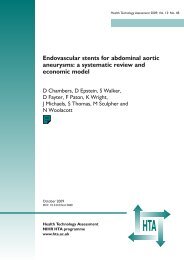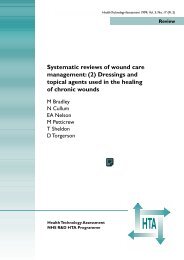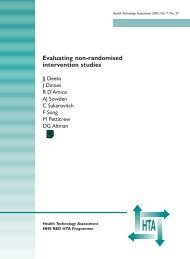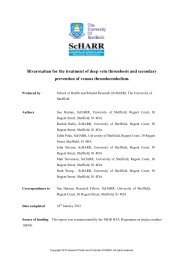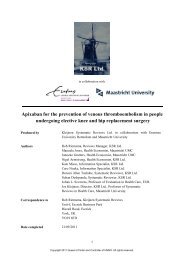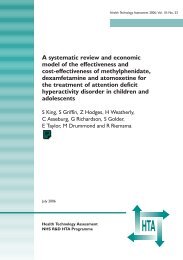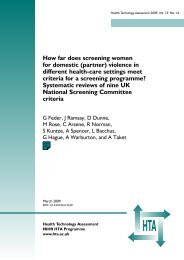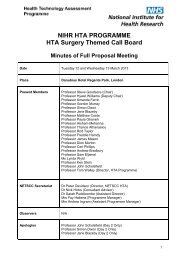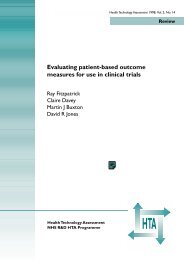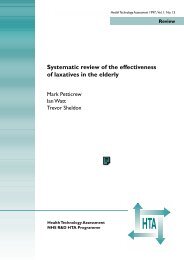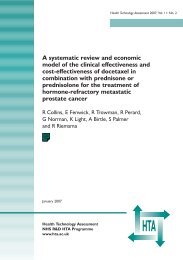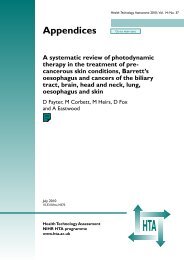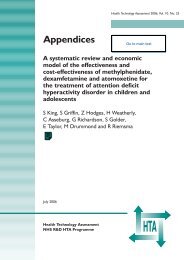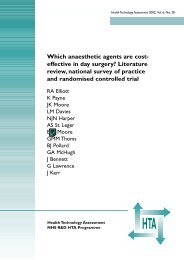Donepezil, rivastigmine, galantamine and memantine for ...
Donepezil, rivastigmine, galantamine and memantine for ...
Donepezil, rivastigmine, galantamine and memantine for ...
Create successful ePaper yourself
Turn your PDF publications into a flip-book with our unique Google optimized e-Paper software.
TABLE 37 Adverse events <strong>for</strong> donepezil versus <strong>rivastigmine</strong><br />
group 11.0 (baseline 11.5). Statistical analyses<br />
were within-group rather than between-group<br />
comparisons.<br />
Compliance<br />
Wilkinson <strong>and</strong> colleagues 69 assessed compliance<br />
between those given donepezil <strong>and</strong> those given<br />
<strong>rivastigmine</strong>. Those defined as reaching the<br />
maximum daily dose at some time during the<br />
study were 98.2% in the donepezil group <strong>and</strong> 60%<br />
in the <strong>rivastigmine</strong> group. Those defined as<br />
remaining at the maximum dose until study<br />
completion or the final visit were 87.5% in the<br />
donepezil group <strong>and</strong> 47.3% in the <strong>rivastigmine</strong><br />
group. These differences were not tested <strong>for</strong><br />
statistical significance.<br />
Adverse events<br />
Various event rates <strong>for</strong> selected adverse events<br />
were reported in the included trials <strong>and</strong> can be<br />
seen in Table 37. The most commonly reported<br />
adverse events related to the gastrointestinal<br />
system, including nausea, vomiting <strong>and</strong> diarrhoea.<br />
Rates of adverse events were generally higher in<br />
the <strong>rivastigmine</strong>-treated participants than in the<br />
donepezil-treated participants, but no statistical<br />
comparisons between the treatment groups were<br />
reported. Adverse events were generally mild to<br />
moderate in severity; however, four participants in<br />
the <strong>rivastigmine</strong> group of the Wilkinson <strong>and</strong><br />
© Queen’s Printer <strong>and</strong> Controller of HMSO 2006. All rights reserved.<br />
colleagues 69 study reported a severe treatmentrelated<br />
digestive system adverse event compared<br />
with none in the donepezil group. Fuschillo <strong>and</strong><br />
colleagues 68 reported no withdrawals due to<br />
adverse events in either study group. In the<br />
Wilkinson <strong>and</strong> colleagues 69 study 10.7% of<br />
donepezil-treated participants <strong>and</strong> 21.8% of<br />
<strong>rivastigmine</strong>-treated participants withdrew owing<br />
to the onset of adverse events. Withdrawals<br />
unrelated to adverse events were reported in the<br />
Wilkinson <strong>and</strong> colleagues 69 study, where more<br />
patients withdrew or died in the <strong>rivastigmine</strong><br />
group than the donepezil group, but this was not<br />
tested <strong>for</strong> statistical significance. Data relating to<br />
withdrawals are given in Appendix 10.<br />
Summary<br />
Health Technology Assessment 2006; Vol. 10: No. 1<br />
Fuschillo et al. 68 % occurrence<br />
<strong>Donepezil</strong> 5 mg/day (n = 16 ) Rivastigmine 1.5–9 mg/day (n = 11)<br />
Nausea 8 15<br />
Vomiting 5 10<br />
Dizziness 10 15<br />
Diarrhoea 8 10<br />
Abdominal pain 5 8<br />
Headache 8 10<br />
Wilkinson et al. 69 Treatment-emergent AEs occurring in ≥ 5% of participants <strong>and</strong> more than twice as frequently<br />
in either treatment group (all causalities). No. (%)<br />
<strong>Donepezil</strong> 5 mg/day (n = 56) Rivastigmine 3–12 mg/day (n = 55)<br />
Nausea 6 (10.7) 23 (41.8)<br />
Vomiting 4 (7.1) 13 (23.6)<br />
Headache 4 (7.1) 10 (18.2)<br />
Anorexia 1 (1.8) 5 (9.1)<br />
Abnormal dreams 4 (7.1) 1 (1.8)<br />
Back pain 4 (7.1) 0<br />
Somnolence 1 (1.8) 3 (5.5)<br />
Urinary tract infection 3 (5.4) 0<br />
Proportion experiencing 42.9% 58.2%<br />
≥ 1 treatment-related advance event<br />
● Two studies compared treatment with donepezil<br />
with treatment with <strong>rivastigmine</strong>. The<br />
methodological quality <strong>and</strong> the quality of<br />
reporting in the studies was generally poor <strong>and</strong><br />
one study had a small sample size. One study<br />
was funded by the manufacturers of donepezil.<br />
● On measures of cognitive ability, general trends<br />
suggest that treatment with <strong>rivastigmine</strong><br />
(1.5–12 mg/day) leads to more improvement<br />
than treatment with 5 mg/day donepezil;<br />
however, these trends are small, are not tested<br />
<strong>for</strong> statistical significance <strong>and</strong> may also reflect<br />
the differences in the doses given.<br />
69



